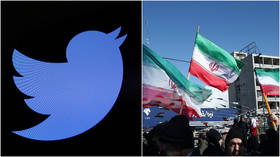Pro-Israel lobby AIPAC frets over US elections after Twitter bans 130 alleged 'Iranian accounts'

AIPAC, the powerful pro-Israel lobbying group in Washington, is raising concerns that Iranian leader Ali Khamenei is trying to influence US elections after Twitter banned about 130 accounts that allegedly originated in Iran.
Twitter said that based on intel provided by the FBI, it removed accounts that “appeared to originate in Iran.” The accounts “were attempting to disrupt the public conversation” during last week's presidential debate between Donald Trump and Joe Biden.
Based on intel provided by the @FBI, last night we removed approximately 130 accounts that appeared to originate in Iran. They were attempting to disrupt the public conversation during the first 2020 US Presidential Debate.
— Twitter Safety (@TwitterSafety) October 1, 2020
“We identified these accounts quickly, removed them from Twitter and shared full details with our peers,” the social media platform said. Twitter added that the accounts had “extremely low engagement” and didn't have an impact on “the public conversation.”“Our capacity and speed continue to grow, and we'll remain vigilant.”
We identified these accounts quickly, removed them from Twitter, and shared full details with our peers, as standard. They had very low engagement and did not make an impact on the public conversation. Our capacity and speed continue to grow, and we'll remain vigilant. Samples ⬇️ pic.twitter.com/1qzzL8l29H
— Twitter Safety (@TwitterSafety) October 1, 2020
Twitter didn't say how, specifically, the accounts tried to disrupt conversation about the debate. The examples it cited seemed innocuous, such as a tweet asking, “Is Chris Wallace non-partisan?” Another said, “Proud boys stand down.”
Nevertheless, alarms were sounded at AIPAC, which said Monday that “Iran is attempting to undermine the voice of the American people,” and “Khamenei does not get a vote in our elections, but that's exactly what he's trying to do.”
Iran is attempting to influence America’s elections.@khamenei_ir does not get a vote in our elections, but that’s exactly what he’s trying to do.The Iranian regime cannot be trusted. pic.twitter.com/Anp0BqfRy3
— AIPAC (@AIPAC) October 5, 2020
AIPAC styles itself as an American organization, funded by private donations, and insists that it receives no funding from the Jewish state or any group outside of the US. Despite its close ties to the Israeli government, AIPAC is not registered under The Foreign Agents Registration Act (FARA), claiming to represent Americans who support Israel, but not Israelis who wish for stronger ties with the US. There have been calls in the recent years for the group to be forced to register under the law, but to no avail.
In the meantime, AIPAC has cultivated strong allies in both the Republican and Democrat parties and wields one of the most influential lobbying voices in Washington.
The irony of AIPAC's warning about foreign interference was not lost on Twitter users. One commenter said, “Thanks for looking out for this! What is it you guys do again?” Another tweeted sarcastically: “Just imagine a foreign country trying to influence elections! Thanks, AIPAC.” Another said, “I'm starting an institute. I'm going to call it the American Iranian Public Affairs Committee. Any idea what the acronym should be?”
Thanks for looking out for this! What is it you guys do again https://t.co/5RfI6b8CVK
— we love what's happening (@Weishampel) October 6, 2020
Hey aren't you a literal foreign lobbying group
— Ash🔻 (@WASBRAPPIN) October 6, 2020
Just imagine, a foreign country trying to influence elections!Thanks, AIPAC.
— Detgrim (@detgrim) October 6, 2020
Other commenters challenged the fairness of Twitter's banning of the supposedly Iranian accounts. “The US can starve the Iranian people during a pandemic and bomb their second-most important public official on his way to peace talks, but Iranians can't tweet,” one observer tweeted, adding “Cool. Good to know.” Another said, “This US is trying to mass-murder Iranian civilians with sanctions, but God forbid they have an opinion on our politics. That's 'disruptive.'”
So let me get this straight. The U.S. can starve the Iranian people during a pandemic and bomb their 2nd most important public official on his way to peace talks, but Iranians can't tweet. Cool. Good to know.
— jeff berg (@Jeffberg42) October 1, 2020
The US is trying to mass murder Iranian civilians with sanctions, but God forbid they have an opinion on our politics; that's "disruptive".
— ⏳☦#WarIsARacket☦⏳ (@For2000years) October 1, 2020
Think your friends would be interested? Share this story!














